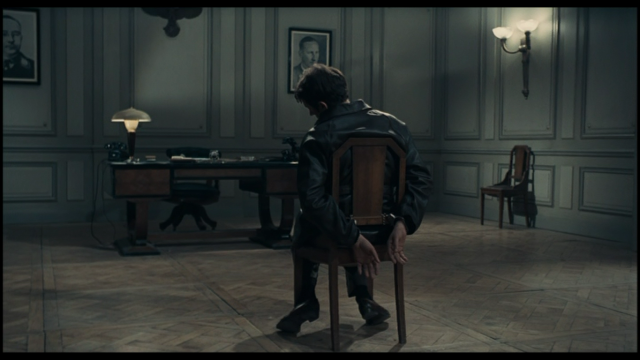Jean Pierre Melville’s Army of Shadows failed to make a huge impression when it was released in France in 1969. The social protests of 1968, and the ideological tumult that they provoked in the nation’s cinephile culture, discouraged serious analysis of what many assumed to be a romantic portrait of the Resistance during WWII. While romanticism plays a heavy part in Melville’s aesthetic, it is of a darker, hard boiled nature in line with the director’s minimalist takes on film noir, and hardly the patriotic celebration of Charles deGaulle’s ability to inspire a persistent spirit of rebellion against Nazi occupation.
That an aura of fatalism pervades the film shouldn’t have come as a shock. Having been influenced by a more Avant garde sensibility at the beginning of his career (even directing an adaptation of Jean Cocteau’s L’Enfants terribles in the 1940s), Melville began applying a reductionist style to hard boiled crime narratives mostly associated with American film noir, beginning with the James M. Cain inspired La Doulos in 1964. His economy of speech and gesture, coupled with a rigidity of visual composition and camera movements in these homages resembles the austere style of Carl Dreyer and Robert Bresson. Where his forbearers delivered a feeling of spiritual transcendence in his films, Melville remained grounded in materialism, his movies revealing a truth that comes from the nature of social interaction, rather than an external spiritual force. This tendency, of course, also dismissed ideology as a motive for dramatic spectacle, further driving a wedge between Melville and the Left.
Based on a 1943 novel by Joseph Kessel, Army of Shadows chronicles the disassembling of a small cell of resistance fighters, and is told mostly through the perspective of Phillipe Gerbier (Lino Ventura), an anti-fascist intellectual who becomes a hardened master of realpolitik of underground warfare as the film progresses. Starting in medias res, the film introduces Gerbier within the architectural grid of a Nazi prison where he has been detained after being betrayed by an informer. He understands that he is to be interrogated, and probably tortured, so as to reveal information about his associates. The motivation for avoiding imprisonment has less to deal with a desire for freedom but the necessity of keeping the identity of his associates a secret. The meticulous staging of the camp’s environs maps out the subsequent execution of a daring escape.
This, in turn, necessitates the execution of the informer. This murder, undertaken by Gerbier and his associate Felix Lepercq (Paul Crauchet), reveals the unplanned necessities of clandestine revolt. It’s hard to commit an execution in your safe houses without witnesses suspecting that something is amiss or attracting attention from the authorities. Moreover, it foreshadows the brutal fact that the cohesiveness of the group demands the ultimate act of retribution against those that transgress against its security. The maintenance of in internal discipline will ultimately consume the group’s efforts.
After some lengthy expository passages following the first episodes, history repeats itself. Rather than fighting the Germans and the Vichy collaborators, Gerbier and his associates spend the rest of the film staging jail breaks and punishing informers within their midst. All of this comes to naught, as we ultimately discover (Spoiler) that none of this group survive to the end of 1943. In keeping with the spirit of the novel upon which Army of Shadows is based, Melville cloisters the action to a period in which the outcome of WWII hadn’t been settled. Its realities and truths remain divorced from the grand historical outcomes that allowed for the role of the Resistance to become enfolded within a national myth.
By focusing on the process of political insurgency rather than on the ideologies built upon the scaffolding of liberation from Nazi tyranny, Melville can’t help but draw parallels between clandestine freedom fighting and gangsterism. Since they act to bring about a social goal outside of a legal social contact, the cell operates in terms of a code of self imposed discipline and loyalty. The maintenance of these codes and principles occlude loftier political objectives, and ultimately consume the group’s resources, and ultimately their lives. Rather than drawing attention to how the Resistance shaped the political realities of modern France. Melville discerns hard truths embedded within in the dynamics of il criminality. His realities are based in consequences of actions in the immediate sense, and not in their long term historical significance. (For a more detailed philosophical discussion of this matter, I defer to wallflower’s brilliant New Modes for Old Truths piece on Rules for Revolutionaries)
The critical rejection of Melville’s efforts on the grounds of insufficient political commitment makes sense in 1969. It is still a common theme in modern movie criticism. However, its use of film genre tropes to explore historical themes seemed quite relevant in 2006, when a restoration of Army of Shadows received wide international distribution and acclaim. The postmodern blending of meta-fiction and non-fiction had been growing in film culture since the 1990s, and in a way, Melville’s dour use of gangster film tropes seems to have paved the way for the more irreverent genre deconstructions of Quentin Tarantino. The rediscovery of Melville’s epic, in short seems connected to our more modern sensibility, where the evolution of film genres mirrors a more cynical social take on a progressive mode of political theory and history.

